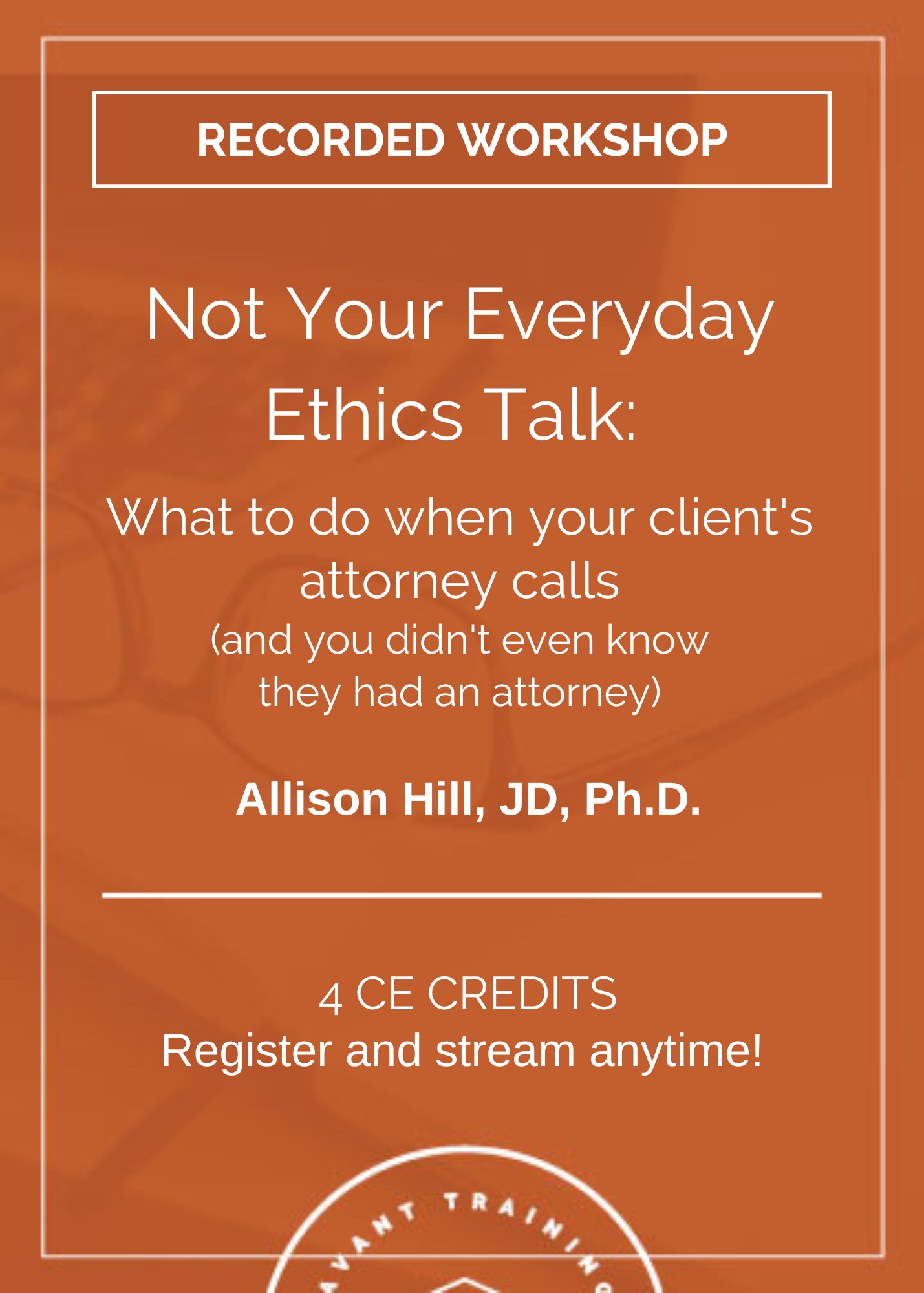Avant Take: Is there a more stressful situation than having your clinical work sucked into the legal system? We don’t really think so. If you have a client who happens into a contentious divorce, or other legal situation, you can spend lots of money on legal consults regarding the ins and outs of confidentiality, subpoenas, consent and more – trust us, we’ve been there – or you can just come to Dr. Hill’s workshop. You cannot afford to be uninformed in this realm – the impacts are significant personally (peace of mind!), professionally (license!), and clinically (client outcomes!).


Allison Hill, JD, PhD
With a law degree from Villanova University and a doctoral degree in Clinical Forensic Psychology from Drexel University, Dr. Allison Hill is uniquely qualified for forensic clinical practice. Indeed, that is how she spends most of her time in her private practice – working with families in transition, couples in high conflict divorce, and conducting parental fitness and child custody evaluations. Dr. Hill is a member of the Georgia Bar, the Georgia Psychological Association, and is a past board member to the American Psychological Association Society for Family Psychology. Dr. Hill is an adjunct faculty member at Emory School of Medicine, and continues to supervise psychiatry residents and psychology students there. Finally, Dr. Hill serves on the Georgia Psychological Association Ethics Committee.
When she isn’t working, she is often found running after her two toddlers, playing tennis or getting outside. It is best when all three (sort of) happen at the same time!
Not Your Everyday Ethics Talk: What to do when your client’s attorney calls (and you didn’t even know they had an attorney)
$165.00
Note: This is a 4-hour recorded workshop. After you sign up, you’ll receive a link to stream the video on Zoom as well as instructions for completing a written post-test (required for CE credit).
It is all too common for clinical practice to intersect with legal issues. Most clinicians have difficulty navigating these challenging and anxiety-provoking situations. This workshop will focus on one of the most common areas of practice where legal issues arise – high conflict divorce – and how to manage those cases and one’s own anxiety while maintaining clinical boundaries and ethical competence.
For adult clients, high conflict divorce may change what they (or their counsel) are seeking from therapy. For these cases, dilemmas related to confidentiality, responding to subpoenas, dual roles, and records release will be illustrated using case examples and vignettes. Participants will discuss how to avoid getting pulled in to the legal context and becoming too aligned with the client in a manner that is clinically counterproductive.
For child and adolescent clients (and yes, they might also have their own attorneys) participants will learn strategies to maintain a systemic perspective, avoid entanglements with the legal system, and stay focused on clinical issues. One of the most challenging related scenarios is working with child clients who are resisting contact with a parent. Participants will learn the research based rationale for describing these cases with “resist-refuse” language rather than “alienation.” Throughout this talk, the limitations of our clinical roles will be explored and the importance of a systemic perspective within high conflict cases will be emphasized.
Learning Objectives
- Describe biases that impact clinical assessment and intervention within a legal context and identify strategies to minimize these biases.
- Demonstrate how to respond to legal requests for records and assess how various responses intersect with ethics codes.
- Identify at least one potential legal entanglement with child clients whose parents are divorcing and a strategy to focus on the relevant clinical issue.
- Explain the rationale for using “resist-refuse” terminology, and the related ethical issues that arise in these difficult and challenging cases.
Continuing Education Credit – 4 Ethics Hours
- APA – Avant Training is approved by the American Psychological Association to sponsor continuing education for psychologists. Avant Training maintains responsibility for this program and its content. This workshop qualifies for Ethics CE hours for psychologists.
- LCSW – This workshop is approved for Ethics CE hours through the Georgia Society for Clinical Social Work. Approval #061622.
- LPC – Avant Training has been approved by NBCC as an Approved Continuing Education Provider, ACEP No. 7225. Programs that do not qualify for NBCC credit are clearly identified. Avant Training is solely responsible for all aspects of the programs.
- LMFT – Related Hours
47 in stock
Cancellation Policy
Please note that there are no refunds offered for recorded workshops. Send us an email at admin@avant-training.com if you have any questions before you register.
